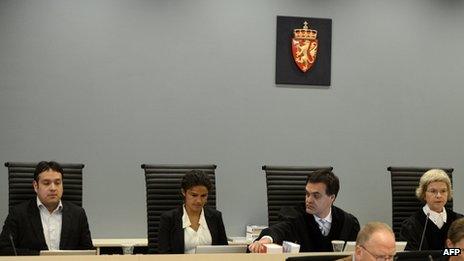Norway's lay judge system
- Published

Disqualified lay judge Thomas Indreboe (left) was one of three lay judges serving alongside two professional ones at the Breivik trial
For over 100 years, citizens in Norway have participated in court cases not only as jurors but as "lay judges".
Norway's justice ministry says that the idea behind their participation is that these independent lay people "should use their common sense and good judgement to determine questions of guilt and innocence".
They provide a counterbalance to "official power and the establishment".
In criminal cases in district courts, lay judges sit together with professional judges to rule on an equal basis on both the question of guilt and on sentencing.
Due to the nature of the case against Anders Behring Breivik, the Oslo court is sitting as an "extended court", with two professional and three lay judges.
All cases before Norwegian courts are presided over by a professional judge, in this case Wenche Elizabeth Arntzen. Professional judges are always law graduates and are civil servants appointed by an independent body.
Locally appointed
Lay judges are appointed by local councils for a period of four years. Lay judges are then drawn from this pool as required for trials.
Anyone selected as a lay judge is obliged to accept the office, and can expect to serve on average twice a year.
Certain groups can claim exemption from serving as a lay judge, including MPs, lawyers and priests, those who have recently been in prison, and people whose Norwegian is not good enough.
Lay judges can also be disqualified, for example if they are found to be too close to the case. In this situation another lay judges steps in and proceedings can continue without a break.
Finding lay judges who were not personally affected by Breivik's 22 July 2011 attacks was reportedly difficult, as so many of Norway's small population had relatives or friends who were killed or injured.
Thomas Indreboe, one of the three lay judges serving at Anders Behring Breivik's trial, was found to have posted comments on Facebook the day after the attacks saying that the perpetrator should face the death penalty.
Although this was before his appointment as a lay judge, lawyers for all sides requested that he be disqualified. Backup lay judge Elisabeth Wisloeff has taken his place.
Appeals
If a criminal case goes to the court of appeal, lay citizens are still involved, though in a different way.
If the appeal involves the question of guilt, then a panel of three professional and four lay judges decide the case. The four lay judges are always two men and two women.
However if the crime carries a sentence of greater than six years, the appeal is heard by a jury, usually consisting of five men and five women.
If the appeal relates to the sentence or to procedural matters, no jury is involved.
- Published14 April 2012